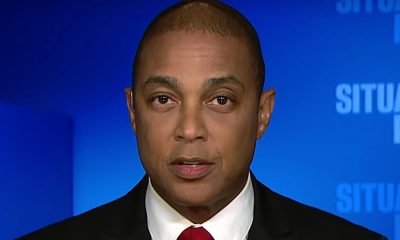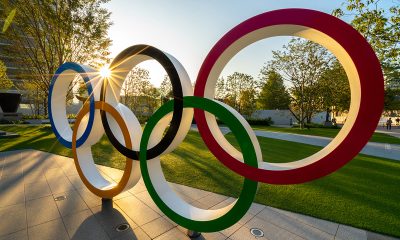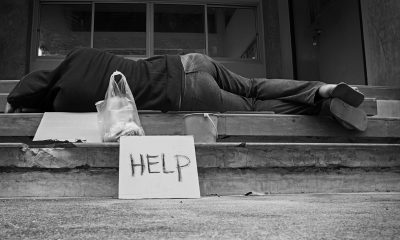National
LGBT activists join progressive rally challenging Tea Party
Lincoln Memorial event includes lesbian, gay, trans speakers
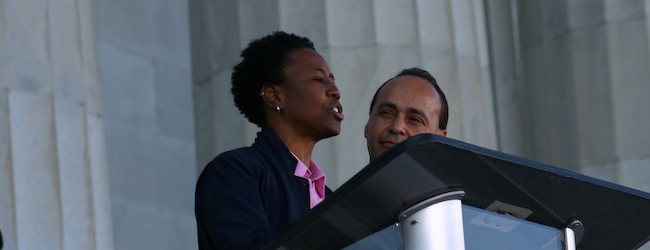
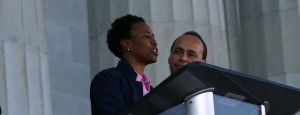
‘I am not either black or lesbian. I am both and much more,’ said Darlene Nipper at Saturday’s One Nation Working Together rally in D.C. (Photo courtesy of the Task Force)
A large contingent of LGBT leaders and activists joined tens of thousands of people who turned out for a rally at the Lincoln Memorial Saturday to mobilize voters backing liberal and progressive policies.
Organizers billed the event as a direct challenge to the Tea Party, whose leaders organized a “conservative” and Christian-oriented rally at the Lincoln Memorial site one month earlier hosted by Fox News commentator Glenn Beck.
The National Black Justice Coalition, the National Gay & Lesbian Task Force and the Human Rights Campaign were among more than 40 LGBT organizations that joined mainline civil rights, labor and immigrant rights groups in sponsoring the Saturday rally called One Nation Working Together.
“I stand here before you today as a proud openly lesbian African-American woman,” said Darlene Nipper, deputy executive director of the National Gay & Lesbian Task Force, who spoke to the crowd from the Lincoln Memorial steps.
“I am not either black or lesbian. I am both and much more,” she said. “And like you, I seek justice for all of us. In America, justice means equal rights for everyone regardless of race, ethnicity, class, sex, gender expression, sexual orientation or ability.”
In her five-minute speech, Nipper joined most of the more than two dozen speakers in sounding a theme of unity among all progressive groups and constituencies.
“We can no longer work in silos, whether by campaign, issue or community,” said Gregory Cendana, a gay official with the Asian Pacific American Labor Alliance, who also addressed the rally from the memorial steps.
“There needs to be an understanding that the fight and struggle for economic justice and workers rights is the same fight and struggle for LGBT equality,” he said. “And for civil and human rights it’s the same as the fight for immigrant justice. And access to equality and education is the same fight for the environment and green jobs.”
Mara Keisling, executive director of the National Center for Transgender Equality, appeared on the speakers’ platform with a group of labor, environmental and education advocates, who recited broad themes of unity for a progressive agenda.
“The whole point is we’re all in this together,” she told the Blade after the rally.
Many of the LGBT participants in the rally, like their straight counterparts, arrived by bus from cities and states along the East Coast, including New York, New Jersey and Pennsylvania. More than 200 LGBT activists held their own smaller rally at Freedom Plaza at 14th and Pennsylvania Ave., N.W., where they were joined by participants completing the D.C. AIDS Walk.
From Freedom Plaza, the LGBT contingent marched to the Lincoln Memorial carrying signs and banners promoting such causes as repeal of “Don’t Ask, Don’t Tell” and passage of the Employment Non-Discrimination Act, which calls for prohibiting job discrimination based on sexual orientation and gender identity.
The National Black Justice Coalition, NGLTF, National Stonewall Democrats and Pride at Work, an LGBT labor group affiliated with the AFL-CIO, sponsored a forum the day before the rally on a national “LGBTQ inclusive social justice agenda” at Howard University School of Law.
Among those attending the Lincoln Memorial rally was former Army Lt. Dan Choi, a national advocate for repealing “Don’t Ask, Don’t Tell.” Choi carried a sign calling for addressing LGBT teen suicide, saying ongoing discrimination was responsible for the recent rash of suicides among gay male teenagers.
Christine Quinn, the lesbian speaker of New York City Council, who also attended the rally, said she was among several thousand New Yorkers attending the event.
“I just wanted to make sure my voice was added to the others today calling for a national discussion that isn’t so divisive, isn’t so full of hate and nasty rhetoric but one that is instead about what we needed right now — jobs, improved public education, fuller civil rights and equal rights for everyone,” she said.
In her remarks at the rally, Nipper cited hate crimes as yet another problem that affects different groups and can be addressed by various groups working together.
“We are so proud that last year Congress passed the Matthew Shepard and James Byrd Jr. Hate Crimes Prevention Act,” she said. “I hope we never forget those two men and the hundreds of others who died at the hands of hatred — Matthew Shepard, who was killed for his gayness, and James Byrd, who was killed for his blackness.
“Yes, our communities are tied and united together,” she said. “Our communities – people of color and those in the lesbian, gay and bisexual and transgender community stand united against hate crimes of any type against anyone.”
Two other prominent out lesbians spoke at the rally — Mary Kay Henry, president of the Service Employees International Union (SEIU) and Randi Weingarten, president of the American Federation of Teachers.
Florida
Disney’s Gay Days ‘has not been canceled’ despite political challenges
GayDays is moving forward with its planned LGBTQ meet-up

Gay Days in Orlando is preparing for its 2026 gathering though organizers have yet to release full details.
Concerns emerged about the status of the annual meetup of LGBTQ people at Walt Disney World in Orlando, Fla., after social media posts and multiple news outlets reported the event would not take place this year.
In response to inquiries from the Blade, Josh Duke, co-owner of Gay Days, clarified that an update would come this week.
“At this time, I’d like to clarify that Gay Days Orlando has not been canceled,” an email to the Blade said. “We are currently finalizing details regarding our plans for 2026 and will be making an official announcement later this week.”
Earlier this week, Gay Days posted about a pause in their plans for the annual meeting, which quickly gained traction online.
In an official statement on social media, Gay Days organizers cited several factors behind what had initially appeared to be a cancellation of their 2026 event.
“Changes to our host hotel agreement, the loss of key sponsorship support, and broader challenges currently impacting LGBTQIA+ events nationwide made it impossible to deliver the experience our community deserves,” organizers wrote. However, the statement added, “This is a pause — not an ending.”
In a longer message shared with supporters, organizers elaborated on that now-reversed decision.
“Gay Days Family — it is with very heavy hearts that we share Gay Days 2026 will not take place this year. This was an incredibly difficult decision and one that was only made after every possible option was explored.
“Gay Days has always been more than an event — it is community, family, and a place where so many memories are made. While this pause is painful, it also gives us the opportunity to step back, listen, and begin shaping a stronger and reimagined GayDays for the future. Thank you for your continued love, patience, and support. This is not goodbye — it’s a reset, and we look forward to creating the future of GayDays together.”
GayDays, which began in 1991, encourages queer Disney fans to visit the Orlando theme park while wearing red shirts to identify one another. Originally focused on gay men reclaiming the childhood joy often denied due to homophobia, the event has expanded over the years to include LGBTQ+ families on summer vacations and queer couples honeymooning in the Magic Kingdom.
Disney made history in 2019 by holding its first-ever official Pride event at its European park, Disneyland Paris. In 2023, Disneyland California hosted the first U.S. official Pride event.
Concerns about the potential cancellation had arisen amid broader challenges affecting LGBTQ events nationwide. These include changes in hotel agreements, sponsorship support, and Florida’s increasingly restrictive anti-LGBTQ policies under Gov. Ron DeSantis. Florida currently has an equality score of -3.00 out of 49 from the Movement Advancement Project, which evaluates states based on policies affecting relationship and parental recognition, nondiscrimination, religious exemptions, LGBTQ youth, healthcare, criminal justice, and transgender identity documentation.
Recent legislation in Florida has included prohibitions on hormone replacement therapy for transgender minors, restrictions on adult access to treatment, bans on drag performances for those under 18, bathroom bans for transgender people in state buildings, and expansion of the Parental Rights in Education Act, commonly called the “Don’t Say Gay” law. These measures limit public school instruction or discussion about sexual orientation and gender identity.
Gay Days Anaheim is scheduled to take place at Disneyland Resort in September.
Disney has also maintained a focus on Pride, reporting in 2022 that proceeds from Pride merchandise benefited numerous LGBTQ organizations, including GLSEN, PFLAG, The Trevor Project, Zebra Coalition, the Los Angeles LGBT Center, the LGBT Center Orange County, the San Francisco LGBT Center, and the Ali Forney Center. Pride merchandise sold internationally supports local LGBTQ organizations in those regions.
More details about this event are expected to be released on Friday.
New York
Pride flag removed from Stonewall Monument as Trump targets LGBTQ landmarks
The new NPS policy targets Pride flags amid consistent efforts from the Trump administration to minimize LGBTQ history.

A rainbow Pride flag flying at the Stonewall National Monument in New York was removed at the direction of Trump administration officials at the National Park Service, according to a source familiar with the matter who spoke to the Blade on condition of anonymity.
The source said the move had been in the works for weeks and is part of ongoing efforts by the Trump-Vance administration to erase LGBTQ identity from federally controlled landmarks.
In response to the Blade’s request for information about the new flag policy, the National Park Service provided the following statement:
“Current Department of the Interior policy provides that the National Park Service may only fly the U.S. flag, Department of the Interior flags, and the Prisoner of War/Missing in Action flag on flagpoles and public display points. The policy allows limited exceptions, permitting non-agency flags when they serve an official purpose. These include historical context or reenactments, current military branch flags, flags of federally recognized tribal nations affiliated with a park, flags at sites co-managed with other federal, state, or municipal partners, flags required for international park designations, and flags displayed under agreements with U.S. Citizenship and Immigration Services for Naturalization ceremonies.”
The statement also included official guidance on the display of non-agency flags issued by Trump-appointed National Park Service Director Jessica Bowron.
The Blade reached out to other organizations to confirm the status of the Pride flag last week, including the Stonewall National Monument Visitor Center, the NYC Landmarks Preservation Commission, and the National Parks Conservation Association. None were able to provide details about whether the flag was still flying at that time but it has since been removed.
This action aligns with other moves targeting and erasing LGBTQ history. In September, the Blade reported that three organizations originally slated to receive more than $1.25 million from the National Park Service’s Underrepresented Communities Grant Program would no longer receive funding: In Washington, D.C., the Preservation League had been awarded $75,000 to document LGBTQ+ historic resources. In Providence, R.I., the Preservation Society was slated for $74,692 to conduct an LGBTQ+ survey and prepare a National Register nomination. And in New York, the Fund for the City of New York, Inc., had been awarded $32,000 to nominate the residence of Bayard Rustin — the iconic civil rights and LGBTQ activist — as a National Historic Landmark.
Puerto Rico
Bad Bunny shares Super Bowl stage with Ricky Martin, Lady Gaga
Puerto Rican activist celebrates half time show

Bad Bunny on Sunday shared the stage with Ricky Martin and Lady Gaga at the Super Bowl halftime show in Santa Clara, Calif.
Martin came out as gay in 2010. Gaga, who headlined the 2017 Super Bowl halftime show, is bisexual. Bad Bunny has championed LGBTQ rights in his native Puerto Rico and elsewhere.
“Not only was a sophisticated political statement, but it was a celebration of who we are as Puerto Ricans,” Pedro Julio Serrano, president of the LGBTQ+ Federation of Puerto Rico, told the Washington Blade on Monday. “That includes us as LGBTQ+ people by including a ground-breaking superstar and legend, Ricky Martin singing an anti-colonial anthem and showcasing Young Miko, an up-and-coming star at La Casita. And, of course, having queer icon Lady Gaga sing salsa was the cherry on the top.”
La Casita is a house that Bad Bunny included in his residency in San Juan, the Puerto Rican capital, last year. He recreated it during the halftime show.
“His performance brought us together as Puerto Ricans, as Latin Americans, as Americans (from the Americas) and as human beings,” said Serrano. “He embraced his own words by showcasing, through his performance, that the ‘only thing more powerful than hate is love.’”
-

 Colombia5 days ago
Colombia5 days agoLGBTQ Venezuelans in Colombia uncertain about homeland’s future
-

 District of Columbia5 days ago
District of Columbia5 days agoD.C. bar Rush facing eviction on charge of failing to pay rent
-

 Sports5 days ago
Sports5 days agoBlade, Pride House LA announce 2028 Olympics partnership
-

 District of Columbia5 days ago
District of Columbia5 days agoD.C. non-profits find creative ways to aid the unhoused amid funding cuts



